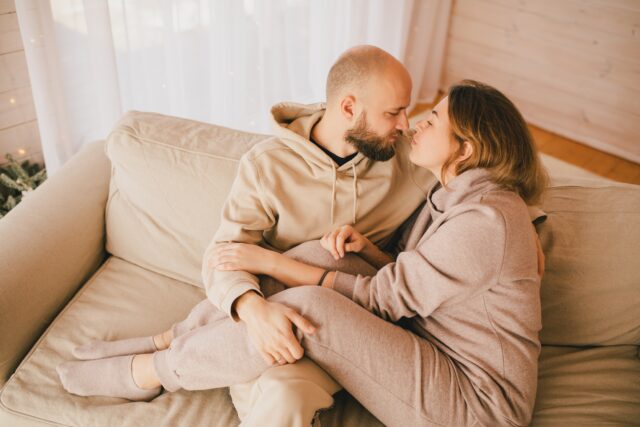True emotional maturity in a relationship is an absolute must if you want the connection to stand the test of time.

All the grand romantic gestures are nice, but they mean little in the long run if that foundation of support and connection isn’t there. Thankfully, emotionally grounded men show up consistently for their partners in ways that build lasting trust and an unbreakable bond. Meeting their other halves in the middle in these ways — because yes, they deserve the same in return — will ensure their love lasts a lifetime.
1. He processes emotions before reacting.

When tensions rise, he takes a moment to understand his emotional state rather than letting reactions fly. Taking a minute to breathe isn’t about suppressing feelings, but about creating space to respond thoughtfully. His partner knows that when tough conversations happen, they’ll get his considered perspective rather than a knee-jerk reaction.
2. He respects emotional boundaries.

Understanding that everyone processes feelings differently, he never pushes his partner to “get over it” or “lighten up.” He gives space when needed and stays present when requested. His respect for emotional boundaries shows up in small ways, like checking in before offering advice or solutions.
3. He owns his emotional baggage.

Instead of projecting past hurts onto current situations, he acknowledges his emotional triggers and works on them actively. He takes responsibility for his healing journey without making it his partner’s burden. When old wounds surface, he communicates openly about where these feelings originate.
4. He stays curious about his partner’s world.
 Source: Unsplash
Source: Unsplash Even after years together, he maintains genuine interest in his partner’s thoughts, dreams, and daily experiences. He asks questions not just to respond, but to understand more deeply. His curiosity extends beyond big moments to the small details that make up his partner’s day.
5. He validates without fixing.
 Source: Unsplash
Source: Unsplash When his partner shares struggles, he resists the urge to immediately offer solutions. Instead, he creates space for feelings to be expressed and acknowledged. His presence communicates that difficult emotions are welcome and don’t need to be rushed away.
6. He shows up consistently in small moments.

His support isn’t reserved for major life events – it’s woven into daily life through small, reliable actions. Whether it’s remembering important details or being present during routine conversations, he shows that everyday moments matter. His consistency builds a foundation of trust that sustains the relationship.
7. He takes initiative in shared responsibilities.

Rather than waiting to be asked, he actively notices what needs attention in their shared life. His willingness to share the mental load extends beyond tasks to emotional and social responsibilities. He understands that relationship maintenance requires proactive effort, not just reactive response.
8. He embraces vulnerability.

He’s not afraid to share his fears, doubts, and insecurities with his partner. His openness isn’t about dumping emotions, but about encouraging genuine intimacy through honesty. His willingness to be vulnerable encourages deeper connection and mutual trust.
9. He maintains his emotional support system.

Understanding that no single relationship can meet all emotional needs, he cultivates meaningful friendships and support networks. Emotional maturity prevents overdependence while modelling healthy relationship boundaries. His partner benefits from his well-rounded emotional life.
10. He acknowledges impact over intent.

When his actions hurt his partner, he focuses on understanding the impact rather than defending his intentions. This approach shows he values his partner’s emotional experience above being right. He knows that healing starts with acknowledgment, not explanation.
11. He celebrates his partner’s independence.

Rather than feeling threatened by his partner’s autonomy, he actively supports their individual growth and interests. He understands that healthy relationships thrive when both people maintain their identities. His security allows space for personal development within the partnership.
12. He communicates concerns early.

Instead of letting resentment build, he addresses issues when they’re still manageable. Such proactive communication shows respect for both the relationship and his partner. He brings up concerns with the goal of understanding and resolution, not blame.
13. He remembers relationship maintenance.

He understands that love needs regular nurturing through both words and actions. Rather than taking connection for granted, he actively works to maintain emotional intimacy. That includes celebrating anniversaries, creating special moments, and expressing appreciation regularly.
14. He shares mental and emotional labour.

From remembering important dates to managing household dynamics, he actively participates in the invisible work of maintaining their life together. He notices what needs attention without being prompted. Sharing responsibility extends to emotional planning and social connections.
15. He respects emotional differences.

Understanding that his partner may process emotions differently, he adapts his support accordingly. He doesn’t expect his partner to handle situations the same way he would, but his acceptance creates space for both partners to be authentically themselves.
16. He prioritises emotional presence.

When spending time together, he’s fully engaged rather than just physically present. He puts away distractions during important conversations and makes eye contact during discussions. His attention communicates that his partner’s thoughts and feelings matter.
17. He practices active forgiveness.

Rather than holding grudges or keeping score, he works through conflicts with the intention of understanding and moving forward. He knows forgiveness is an ongoing process, not a one-time event. His commitment to working through difficulties strengthens the relationship’s foundation.




